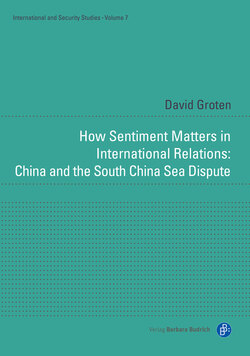Читать книгу How Sentiment Matters in International Relations: China and the South China Sea Dispute - David Groten - Страница 17
На сайте Литреса книга снята с продажи.
2.1.1.4 Possible Political Implications of Respect and Disrespect
ОглавлениеIn light of this background, international respect is generally associated with a number of political implications. First and foremost, respectful behavior is said to provide states, if interpreted accordingly, with a confirmation of their self-ascribed self-worth conceptions and derived claims and expectations, thereby [36] mitigating feelings of injustice and anger. The curtailed generation of adverse sentiment and contempt, in turn, may increase a victim state’s ability and will to identify and consider other countries’ psychological needs and expectations. Empathy and thorough knowledge about other states’ self-evaluative needs, motives and expectations, in turn, help others to better comprehend their behavior and intentions, thereby reducing the risk of misperceptions that lead to confronting policy responses, as reflected in both measures and preferences (Kelman, 2005). In addition, (mutual) respect is said to facilitate the establishment of trust and confidence among states and alleviate concerns about relative status. For instance, mutually acknowledged status differences can discourage actors from adopting confronting policy measures and are capable of generating mutual understanding and trust instead (Hogg & Abrams, 2003). Ultimately, respected and recognized states that feel that their needs are taken seriously, are more inclined to pursue policies of cooperation37, are keener to engage in cooperative collaboration and less likely to defect from cooperation in the future (Kelman, 2005; Tyler & Blader, 2000). In the same vein, several studies suggest that the probability of future defection from (norms of) cooperation declines even further if respect is experienced over a longer period of time (Checkel, 2005). Such logic pertaining to a link between respect and cooperation is jointly shared by Wolf (2011) contending, “the stronger the respect between two actors, especially their respect for each other’s achievements, faculties, and importance, the easier they will arrive at a common definition and solution for a problem at hand“ (p. 125).
Conversely, a perceived lack of due respect can significantly hamper international cooperation, not least as inaction or a ‘simply carry on mentality’ by the victim state is quite improbable if disrespect is perceived to be severe. For instance, disagreement on status and non-recognition of status expectations can lead to status conflicts (Gould, 2003) that in turn hamper cooperation and the generation of trust and confidence. Even worse, perceived disrespect fuels adverse sentiment while prompting states to adopt confronting attitudes, riskier measures and eventually engage in conflict-prone behavior. In general, disrespect experiences negatively affect the relationship between victim and perpetrator (and beyond). This dynamic generates a political dilemma: Somewhat akin to a typical game-theory scenario38 (Morrow, 1994; Snidal, 1985), victims of disrespect, especially if experiencing anger and injustice, [37] may feel a strong necessity to adopt retaliatory measures that are not in line with their initial preferences and previous norms. At the same time, disrespect-induced anger is said to negatively affect the ability and willingness of state actors to make decisions in an informed, somewhat neutral, risk-averse and empathic manner (Kahnemann & Tversky, 1979). A high level of disrespect fuels the victim state’s urge to redress this situation and “seek justice through acts of commission” (Miller, 2001, pp. 544, also cf. Greenberg & Scott, 1996), thereby potentially superimposing traditional preferences of stability, cooperation and certain norms such as harmony. Subsequently, the perpetrator is anticipated to interpret the victim’s retaliatory response as a non-adequate consideration of its very self-evaluative needs as well. In the end of this admittedly quite simplistic example, voluntary or involuntary defection from cooperation (Folger & Skarlicki, 1998, Lind, 2000; Tyler & Blader, 2001) and exacerbation of bilateral tensions are likely outcomes, even though both may have been desired in the first place by any party involved, especially not the victim state. At the same time, insecurities and security dilemma dynamics tend to proliferate in the wake of rising tensions and enhanced disrespect. In the absence of trust and knowledge (and interest) about others’ sincere intentions and psychological needs, states are inclined to assume the worst and take higher risks, particularly if disrespect is engraving and experienced over a longer period of time (Checkel, 2005). In this vein, Craig draws a link between the perception of respect and security by stating that “any threat to China’s ‘national dignity’ and ‘status of equality in the international community’ is considered to endanger the country’s security” (2007, p. 15).
In a nutshell, the project at hand holds that disrespect dynamics account for the adoption, preference and proposition of retaliatory measures, gestures and verbal complaints. Due to the experience of disrespect and negative emotions that are commonly associated with it, such retaliation is expected to be deemed as just, legitimate and necessary, thereby curtailing the victim’s propensity to engage in self-criticism and empathy. Consequently, disrespect dynamics are regarded as not conducive to cooperation, let alone effective and sustainable conflict management, neither in the SCS nor in any other dispute of that kind. On the contrary, a vicious circle of reinforcing disrespect dynamics with adverse effects on trust, empathy and self-reflection may set in, hence further hampering a careful consideration of mutual respect sensitivities, needs and associated claims and expectations. Following this logic, if disrespect experiences and dynamics were found to be crucial in China’s SCS policy between 2010 and 2016, implications would be profound, not only regarding the development of China’s SCS approach and the future of the SCS dispute, but also in terms of the overall relevance of respect, status and cognitive [38] variables at large, both in the realm of international politics and foreign policy analysis.
